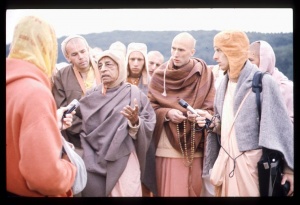SB 10.54.8: Difference between revisions
No edit summary |
(Vanibot #0054 edit - transform synonyms into clickable links, which search similar occurrences) |
||
| Line 23: | Line 23: | ||
<div class="synonyms"> | <div class="synonyms"> | ||
''hastāḥ'' | ''[//vanipedia.org/wiki/Special:VaniSearch?s=hastāḥ&tab=syno_o&ds=1 hastāḥ]'' — hands; ''[//vanipedia.org/wiki/Special:VaniSearch?s=sa&tab=syno_o&ds=1 sa]'' — with; ''[//vanipedia.org/wiki/Special:VaniSearch?s=asi&tab=syno_o&ds=1 asi]'' — swords; ''[//vanipedia.org/wiki/Special:VaniSearch?s=gadā&tab=syno_o&ds=1 gadā]'' — clubs; ''[//vanipedia.org/wiki/Special:VaniSearch?s=iṣu&tab=syno_o&ds=1 iṣu]-[//vanipedia.org/wiki/Special:VaniSearch?s=āsāḥ&tab=syno_o&ds=1 āsāḥ]'' — bows; ''[//vanipedia.org/wiki/Special:VaniSearch?s=karabhāḥ&tab=syno_o&ds=1 karabhāḥ]'' — fingerless hands; ''[//vanipedia.org/wiki/Special:VaniSearch?s=ūravaḥ&tab=syno_o&ds=1 ūravaḥ]'' — thighs; ''[//vanipedia.org/wiki/Special:VaniSearch?s=aṅghrayaḥ&tab=syno_o&ds=1 aṅghrayaḥ]'' — legs; ''[//vanipedia.org/wiki/Special:VaniSearch?s=aśva&tab=syno_o&ds=1 aśva]'' — of horses; ''[//vanipedia.org/wiki/Special:VaniSearch?s=aśvatara&tab=syno_o&ds=1 aśvatara]'' — donkeys; ''[//vanipedia.org/wiki/Special:VaniSearch?s=nāga&tab=syno_o&ds=1 nāga]'' — elephants; ''[//vanipedia.org/wiki/Special:VaniSearch?s=uṣṭra&tab=syno_o&ds=1 uṣṭra]'' — camels; ''[//vanipedia.org/wiki/Special:VaniSearch?s=khara&tab=syno_o&ds=1 khara]'' — wild asses; ''[//vanipedia.org/wiki/Special:VaniSearch?s=martya&tab=syno_o&ds=1 martya]'' — and humans; ''[//vanipedia.org/wiki/Special:VaniSearch?s=śirāṁsi&tab=syno_o&ds=1 śirāṁsi]'' — heads; ''[//vanipedia.org/wiki/Special:VaniSearch?s=ca&tab=syno_o&ds=1 ca]'' — also. | ||
</div> | </div> | ||
Latest revision as of 19:27, 17 February 2024

A.C. Bhaktivedanta Swami Prabhupada
Please note: The synonyms, translation and purport of this verse were composed by disciples of Śrīla Prabhupāda
TEXT 8
- hastāḥ sāsi-gadeṣv-āsāḥ
- karabhā ūravo 'ṅghrayaḥ
- aśvāśvatara-nāgoṣṭra-
- khara-martya-śirāṁsi ca
SYNONYMS
hastāḥ — hands; sa — with; asi — swords; gadā — clubs; iṣu-āsāḥ — bows; karabhāḥ — fingerless hands; ūravaḥ — thighs; aṅghrayaḥ — legs; aśva — of horses; aśvatara — donkeys; nāga — elephants; uṣṭra — camels; khara — wild asses; martya — and humans; śirāṁsi — heads; ca — also.
Translation and purport composed by disciples of Śrīla Prabhupāda
TRANSLATION
Lying all around were thighs, legs and fingerless hands, along with hands clutching swords, clubs and bows, and also the heads of horses, donkeys, elephants, camels, wild asses and humans.
PURPORT
Karabhāḥ indicates the portion of the hand from the wrist to the base of the fingers. The same word may also indicate an elephant's trunk, and thus in this verse the implication is that the thighs lying on the battlefield resembled the trunks of elephants.